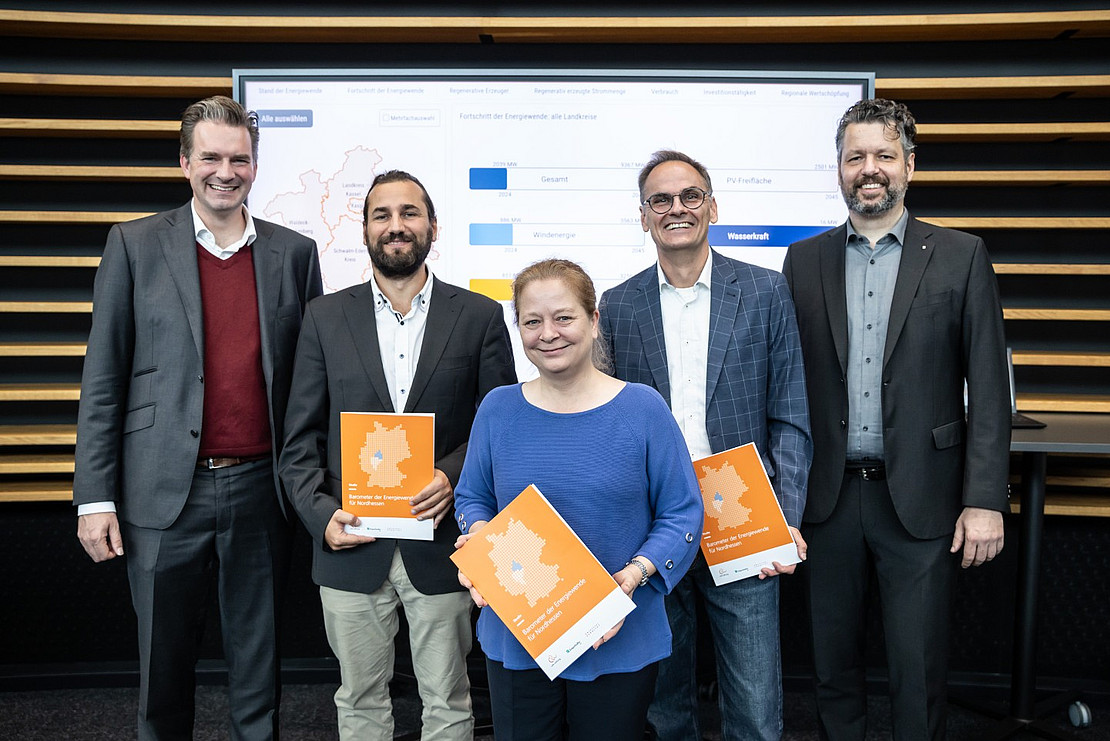This page contains automatically translated content.
New study provides figures on the status and future of the energy transition in North Hesse
 Image: Heiko Meyer/cdw
Image: Heiko Meyer/cdwWith the energy transition barometer, the Fraunhofer Institute for Energy Economics and Energy System Technology IEE has been commissioned by the cdw Foundation to examine the extent to which the self-imposed climate targets and the required pace of expansion of renewable energies are in line in northern Hesse. The study is supplemented by an assessment of regional value creation by the University of Kassel.
Northern Hesse has what it takes to be a pioneering region
The background to the Energy Transition Barometer is the German government's goal for Germany's energy to come almost entirely from renewable sources by 2045. "To achieve this, all regions across Germany have a duty to make their contribution," says Thomas Flügge, Managing Director of the cdw Foundation. North Hesse aims to supply 100% of its mobility, electricity and heat from climate-neutral sources such as wind, solar, biomass and water by 2040. "Our region can play a pioneering role in the energy transition. On the one hand, rural areas such as northern Hesse can make a significantly greater contribution to wind power and photovoltaics than urban areas due to the availability of land. Secondly, we have special expertise here, particularly in the areas of decentralized energy technology and energy efficiency. Northern Hesse has what it takes to be a pioneering region in terms of renewable energies and the energy transition."
The President of the University of Kassel, Prof. Dr. Ute Clement, adds: "In North Hesse, we have a strong network to drive forward the energy transition in an exemplary manner. This includes a university that is successfully making a name for itself in research and teaching on sustainability. Working together with politics, science and business to make the region more sustainable and drive forward the energy transition here is a huge opportunity for North Hesse"
However, the latest figures compiled by the authors of the Fraunhofer IEE and the University of Kassel for the fundamental study "Barometer of the Energy Transition for Northern Hesse" show that although the potential is there, it is not yet being fully exploited. "Even though we already cover more than half of our consumption from regionally generated renewables, we still have a long way to go to completely replace fossil fuels and ensure clean and affordable energy in the long term," emphasizes Sarah Link, Managing Director of the cdw Foundation. "In our view, the barometer of the energy transition offers indispensable guidance on the path to climate neutrality. And it should be a driving force for politics, business and society," explains Link.
According to the study, North Hesse could produce enough electricity from wind, sun and other sources to cover 100 percent of its own electricity needs as early as 2029.
However, ambitious steps are still required to achieve this, as outlined in the study.
The Fraunhofer IEE scenarios are supplemented by calculations from the University of Kassel on regional value creation: since 2000, investments and ongoing operating costs for renewable electricity generation in northern Hesse have totaled 6.3 billion euros, of which around 3.1 billion euros have remained in the region. Since 2018, renewable energies in North Hesse have generated at least 200 million euros in regional added value every year. "The expansion of renewable energies is not only a question of climate protection for North Hesse, but also a decisive economic factor," explains Prof. Heike Wetzel, Head of the Department of Microeconomics and Empirical Energy Economics (MEE) at the University of Kassel. "The investments and operating costs for renewable energies not only reduce electricity imports, but also sustainably strengthen the economic development of the region. Consistent expansion of renewable energies brings both economic benefits and security of supply to North Hesse."
Joint regional action
The Energy Transition Barometer for North Hesse is special: It provides detailed observations for the whole of North Hesse as well as for the five districts and the city of Kassel individually. "The regionalized scenarios are groundbreaking. This is because the results show how important coordinated regional action is in order to achieve the climate targets," explains Maximilian Kleebauer, Project Leader at Fraunhofer IEE. As an example, he cites the limited space available in the city of Kassel, which prevents the construction of wind turbines. Nevertheless, the city offers great potential, particularly through the further expansion of photovoltaic systems on roofs. Districts such as Waldeck-Frankenberg and Hersfeld-Rotenburg, on the other hand, could generate electricity from wind power in excess of their own requirements.
"The cdw barometer shows: The path towards energy sovereignty in North Hesse is not only possible, but also worthwhile," says Lord Mayor Sven Schoeller, summarizing the results of the study from the perspective of local politics. "With 3.1 billion euros in the past two decades, renewable energies have created added value and jobs in North Hesse. What is also important to me is that the energy transition must be conceived and implemented regionally. As a city, our most important task is the consistent expansion of solar energy. The expansion rates in Kassel in 2024 are already higher than ever before before the end of the year! This gives us confidence for the road ahead."
"The interaction between urban and rural areas is crucial for the success of the energy transition in North Hesse," concludes Kai Georg Bachmann, Managing Director of Regionalmanagement Nordhessen GmbH. "Only through close regional cooperation can we achieve our climate targets and develop North Hesse into a sustainable and climate-neutral region."
The Barometer of the Energy Transition for North Hesse will continue to show how committed the region of North Hesse is to its own climate-neutral energy future, with updated data each year.